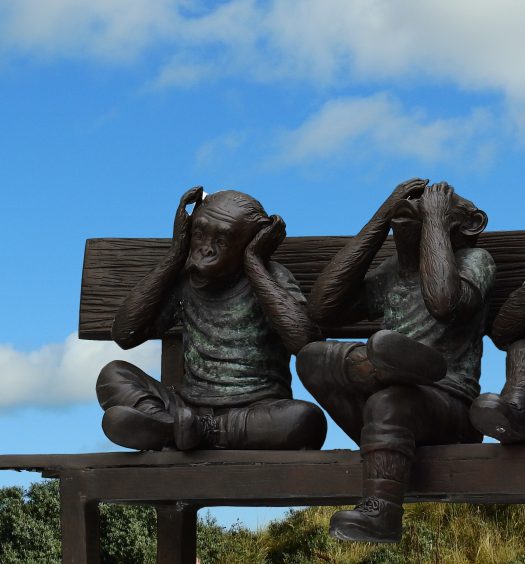The 17th and 18th centuries were characterized by the consolidation of European colonialism over much of the world and the rise of the Atlantic slave trade. This period is known in philosophy as the “modern” era. Modern philosophy was characterized above all by its dualisms, which have their origins, like Western philosophy, in the Greeks: between body and mind, culture and nature, civilized and savage, state and anarchy, human and animal.
Applied at different scales, these are all the same dualism. They exalt the intellectual over the physical, and use spirit, mind, and culture, understood in a particularly self-serving way, as standards of who counts as a moral agent—as a human being—and of what groups or cultures are worthy of respect. As philosophical concepts, these allegedly opposed pairs are excruciatingly problematic. But they are not only philosophical ideas: they were precisely the content of the alleged difference between European people and people of color, as Europeans understood it; the abstract metaphysics became an all-too-concrete ideology of exploitation.
Sub-Saharan African peoples, as well as the indigenous peoples of the Americas, were pictured relentlessly, even in the Enlightenment philosophical texts themselves, as sheer bodies, while the European thinkers were, in their own view, minds. Indigenous peoples were understood to be still part of nature (and were devalued in that identification), whereas Europe had supposedly emerged from nature into culture. That was the fundamental way that Europeans justified to themselves the oppression they were inflicting and congratulated themselves on their own alleged superiority and suitedness to be rulers and exploiters.
In other words, white supremacy lurks at the heart of Western metaphysics. This structure is formulated with crystal clarity by Descartes, who separates mind and body as two fundamentally different sorts of things and arranges them in a hierarchy of value. “Reason alone makes us men and distinguishes us from the beasts,” he declares, echoing Plato and Pythagoras. “I am,” he argues, “precisely nothing but a thinking thing; that is, a mind, or intellect, or understanding, or reason.” We might think of this as the imaginary construction of white identity, and if any person, even René Descartes, considers himself “nothing but a thinking thing,” he is profoundly self-deluded, and other people are probably servicing his physical needs.
Relentlessly, Western political tradition values mind over body, intellectual over manual labor, reason over passion. And European philosophy of the modern era, also relentlessly, associates mind with the sort of people who came to think of themselves as “white men,” and body with the sorts of people they were oppressing around the world, with somewhat different flavors depending on whether the people they were talking about were women, or Africans, or Asians, or Native Americans. Descartes held that each of us was two things: an angel and an animal, as it were, a pure soul and a bestial body. Colonialism and the nascent “science” of race simply externalized this dualism, so that some people (educated Europeans, primarily) were supposed to be pure minds—and hence suited to rule—while others (the people that Europeans were encountering all over the world, and on whom they were imposing their dominance) were supposed to be mere bodies. It is ironic, however, that ruling requires massive use of physical force, implying that white supremacism does anything but transcend the physical plane.
Modern political theory circled around the same set of distinctions. Thomas Hobbes, in the Leviathan, purports to observe that “the savage people in many places of America . . . have no government at all; and live at this day in [a] brutish [animalistic] manner.”[2]
The ethics of Immanuel Kant, and of many others up to the present day, emphasizes that to be rational is to be free, and hence that to be irrational is to be enslaved. Reason is the faculty by which the mind controls the body; reason is suited to control the physical world. The body in the world, for Kant, must be distinguished from the ‘transcendental subject,’ the moral agent, who is outside of space and time, and who is the lawgiver of himself, that is, the appropriate center of power. Exercised internally, this is the drama of self-control; one becomes a good person by bringing one’s unruly bodily desires to heel by rational deliberation. (There is even a contemporary neurological version that purports to distinguish the “executive region” from the amygdala, the primitive or animal or emotive bit.) Exercised externally, it is quickly adaptable into white domination over the colored world.
Kant famously argues that rational creatures must be treated as ends and not merely as means. He calls that “dignity” and holds it to be a (or the) most basic moral principle that persons with such dignity must be treated with “respect.” The complement of this doctrine is that irrational creatures can legitimately be treated as mere means, and with disrespect. To claim of some person or some culture that it is irrational and hence animalistic, opens them to the use of creatures who regard themselves as rational, such as Kant’s European readership.
In the first European defense of the African slave trade (1444), a Portuguese courtier (Gomes Eanes de Zurara) argued that Africans were better off in slavery, and claimed that in Africa “They lived like beasts, without any custom of civilized beings. . . They were without covering of clothes, or the lodgement of houses; and worst of all, they had no understanding of good, but only knew how to live in bestial sloth.”[4]
The direct motivation for colonialism was economic, not metaphysical. But the structures mirror each other, and when Europeans came into contact with and conquered other peoples, they used the existing forms of thought, derived from figures such as Plato, to explain or rationalize the exploitation and even genocides that they were engaged in. “When soul and body are both in the same place,” wrote Plato in the Phaedo, “nature teaches the one to serve and be subject, the other to rule and govern.”[5] A couple of millennia later, the “place” where soul and body meet might be the Belgian Congo. Or for that matter South Carolina.
This symbolic repertoire has been adapted to various issues and circumstances, but it is remarkably persistent. Through slavery and Jim Crow, lynching and mass incarceration, black people have been relentlessly regarded and treated as animal bodies by white people. That is not about black people at all, but about the hallucinatory self-image of people who regard themselves as white: it is an attempt to build and enforce a self-image for white people as being spiritual and intellectual beings, and hence suited to know and to rule, to command themselves and hence others, to manage everyone’s lives as one’s own mind should rationally control one’s body. Every white stereotype of black people, first, is relentlessly animalizing or physicalizing, and second, rests on a devaluation of the physical and an exaltation of the intellectual. The association of non-white people with violence and sexuality, with crime or laziness, and their economic exploitation as physical labor, are all rationalized by this application of basic metaphysical dualisms.
This becomes a worldwide structure of oppression, in which rational Westerners, or “experts” of various sorts, are called upon to control unruly and irrational elements: the classic “white man’s burden.” Indeed, a pre-eminent issue in European philosophy at the end of the Modern period, around 1750-1850, was the relation of sheer material reality, conceived as a deterministic realm in which human beings were enslaved by physical causes, and the realm of Spirit or freedom. This was the fundamental dilemma of our lives and our world, as Kant, Schiller, Schelling, and Hegel, for example, framed it. But it was also the shape of the political rhetoric justifying colonialism, for example.
Astonishingly, the whole network of views persists. For example, John Martin Fischer fills his book The Metaphysics of Free Will with the sort of observation that appears at the outset of many a classic work of Western philosophy: “The possession of regulative control is precisely what distinguishes us from non-persons,” he says as he concludes. “After all, the behavior of an animal appears to be the product of strong instinctual urges. . . . Non-human animals . . . are not persons; they do not have strong rights to continue to exist,” and are beneath our moral approval or disapproval: beneath contempt, we might say.[6] They can legitimately be used for our purposes, while only persons deserve moral respect. Fischer’s account of moral agency indicates that it is anomalous in the order of nature. In various moments in the tradition, the “rational subject” is supposed to be outside that order entirely. Rarely has there been a more bizarre or thorough self-deception.
Many philosophers, right up to the present moment, take the fundamental view that rationality or ‘mind’ distinguishes humans from other sorts of things, and that rational creatures have a superior sort of value. “Reason is a power we have in virtue of a certain type of self-consciousness,” says the contemporary moral philosopher Christine Korsgaard, taking up the point of view of Descartes and Kant. “This form of self-consciousness gives us a capacity to control our beliefs and actions that the other animals lack, and makes us active in a way they are not; this form of self-consciousness makes it necessary to take control of our beliefs and actions.” Projected outward, it seems to make it necessary to take control of animalistic people, in order to create a rational society.
I am not suggesting that Plato, Descartes, or Kant, much less Fischer and Korsgaard, are white supremacists. Descartes was probably writing too early to engage that set of beliefs directly, and Plato certainly was. Kant’s liberal politics are in many ways incompatible with racism, and the same goes for Korsgaard’s (and, I assume, Fischer’s as well). But I am suggesting that the sort of metaphysics and ethics they all endorse grew up in connection with white supremacism and helped shape it. They are, as it were, isomorphic. And I suggest that this structure of thought lies beneath some of our ill treatment of other animals and the environment as well. The whole picture is subject, I think, to compelling philosophical objections. And its social applications have been self-serving and profoundly oppressive.
Notes:
[1] Thomas Hobbes, Leviathan (Penguin, 1968), p. 187.
[2] David Hume, “Of National Characters,” Essays and Treatises on Several Subjects (London, 1758), vol. 1, 125n.
[3] Quoted in Ibram X. Kendi, Stamped from the Beginning: The Definitive History of Racist Ideas in America, (Bold Type, 2016), p.24.
[4] Arthur de Gobineau, Essay on the Inequality of the Races, translated by John Nale in “Arthur de Gobineau on Blood and Race,” Critical Philosophy of Race, Vol. 2, No. 1 (2014), pp. 111-12.
[5] Plato, The Phaedo, trans. Hugh Treddenick, in Complete Dialogues of Plato (Princeton, 1982), p.63 (80a).
[6] John Martin Fischer, The Metaphysics of Free Will (Blackwell, 1994), p. 190.
[7] Christine Korsgaard, Self-Constitution: Agency, Identity, and Intengrity (Oxford, 2009), p. xi.



